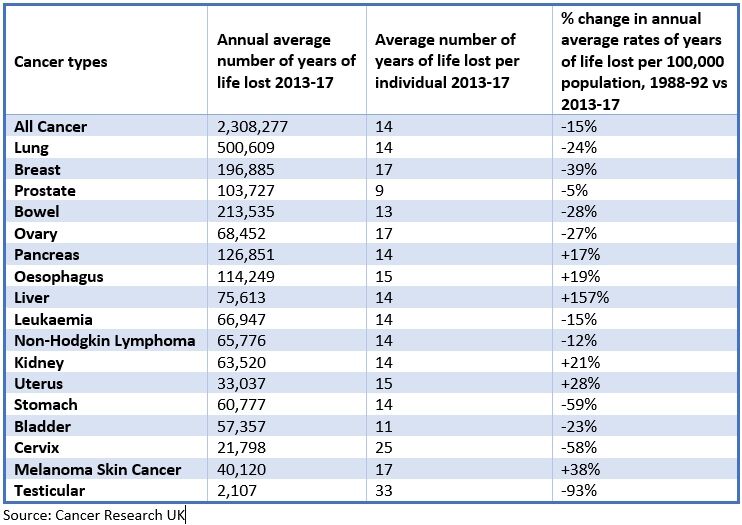More than 2.3 million years of life are lost to cancer every year in the UK, but rates fell during the period of analysis due to advances in research and innovation, according to a new study from Cancer Research UK.
Researchers from King’s College London and Queen Mary University of London used the age at which cancer patients died from their disease and average life expectancy for the general population to estimate how many years were lost to cancer between 1988 and 2017.
The first statistical analysis of its kind and published in the British Journal of Cancer, the study found that overall years of life lost per year to all cancers combined has risen since the 1980s, largely due to the growing population.
Between 2013 and 2017, there annual average number of years of life lost was 2,308,277 for all cancers, up from 2,167,348 in 1988-92. However, when comparing the change in annual average rates of years of life lost per 100,000 population between 1988-92 and 2013-17, the average lost per individual had decreased for all cancers by 15%.
In 2013-17, more than 500,000 years of life – around a fifth of the total – were from lung cancer, which the researchers put down to its high diagnosis rates and poor survival. A total of 213,535 years of life were lost to bowel cancer each year and 196,885 to breast cancer.
When comparing the two time periods, lung, bowel and breast cancer rates were -24%, -28% and -39% respectively. The biggest decreases in these rates were seen in stomach (-59%) and cervical (-58%) cancers.
As testicular cancer is less common, a smaller number of lost years were seen overall, however its personal impact was substantial with an average of 33 lost years of life per individual. Though relatively few people die from the disease, survival is high and those who do die are usually younger.
In addition, while prostate cancer makes up 26% of cases amongst men, it only accounts for 9% of annual years of life lost due to the older age people are usually diagnosed and the relatively high survival rates.
Dr Judith Offman, who led the work at King’s College London and is now senior lecturer in cancer prevention and early detection at Queen Mary University of London, said: ‘This analysis allows us to see the impact cancer has on patients and their families, and the precious time that is lost as a result. Measuring years of life lost over a 30-year period provides a different lens to evaluate where health policies and advances in treatment have worked and highlight areas where more needs to be done.
‘Research like this is instrumental in helping leaders in health and politics make the best decisions for patients and their loved ones.’
This comes ahead of the publication of Cancer Research UK’s Manifesto for Cancer Research and Care, which is expected in the autumn and will outline exactly what it believes the UK Government can do to help beat cancer.
This will include driving progress in the prevention, diagnosis and treatment of cancer, investment in research and innovation, and addressing chronic staff and equipment shortages within the NHS.











